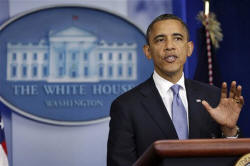LDN - Other News
 |
|
|
 Sandy forces political pause with 7 days left Sandy forces political pause with 7 days left
 Send a link to a friend
Send a link to a friend
[October 30, 2012]
WASHINGTON (AP) -- The havoc unleashed by Superstorm Sandy is bringing an unnerving pause to the presidential campaigning as President Barack Obama and rival Mitt Romney adjust the breakneck pace of the contest's final days to the anxieties and escalating emergency demands sweeping the Eastern Seaboard.
|
|
 Seven days before the election, both men and their running mates tempered their campaigns for Tuesday, eager not to appear out of sync with more immediate worries over flooding, power outages, economic calamity and personal safety. Neither Obama nor Vice President Joe Biden planned to campaign Tuesday. Romney was going forward with a planned event in Ohio, but his campaign said its focus would be storm relief. Seven days before the election, both men and their running mates tempered their campaigns for Tuesday, eager not to appear out of sync with more immediate worries over flooding, power outages, economic calamity and personal safety. Neither Obama nor Vice President Joe Biden planned to campaign Tuesday. Romney was going forward with a planned event in Ohio, but his campaign said its focus would be storm relief.
The fierce storm was clearly overwhelming politics, striking at the heart of the nation's financial district with a surge of seawater in New York City that prompted flooding and utility shutdowns in lower Manhattan. Millions were left without power as the deadly storm whipped its way through presidential battlegrounds like North Carolina, Virginia and New Hampshire and sprawled as far as the Great Lakes, where gales threatened Ohio's and Wisconsin's lakeside regions.
Obama shifted promptly from campaign mode to governing, abandoning a Florida event to return to Washington. Displaying authority like only an incumbent can, he received a briefing from his top emergency advisers, his second in so many days. He then addressed reporters at the White House, insisting that the public follow the directives of their local officials and warning that recovery from the giant storm would not be swift.

Obama voiced concern over the storm's effect on the economy, and the disruptions in New York's Wall Street region were bound to be among those that preoccupied the administration Tuesday. Storm damage was projected at $10 billion to $20 billion, making it one of the costliest natural disasters in U.S. history.
Unwilling to cede the mantle of leadership to Obama, Romney spoke by phone to Deputy FEMA Administrator Richard Serino and officials from the Homeland Security Department and the National Weather Service. Addressing supporters in Davenport, Iowa, he cautioned, like Obama, that the damage would likely be significant and that outages would last long.
In the competition for attention, Obama held the edge, however. "This is going to be a big storm," he warned, as cable television broke off to carry his message live. "It's going to be a difficult storm. The great thing about America is when we go through tough times like this we all pull together."
Such is the advantage of incumbency, provided things don't go wrong. The potential for debacle was clearly on the minds of White House officials as the storm made its furious landfall in New Jersey Monday evening and pounced on New York.
| | | |
[to top of second column]
 As the storm advanced, partisanship for the moment appeared to recede. New Jersey Republican Gov. Chris Christie, who has campaigned vigorously against Obama with Romney, tweeted that Obama had called him Monday afternoon and told him that if he needed anything to call him directly. "I appreciated that leadership and I will if/when we do," Christie wrote.
At a post office just outside the Chesapeake Bay fishing and tourist village of Mathews, Va., William Sullivan, a 76-year-old retiree, said he was glad the president had suspended his campaign to focus on the federal response but said he didn't think it would affect voter preferences.
"People have their mind made up," Sullivan said. "Far as I'm concerned, doesn't gain him anything. Doesn't lose him anything, either."
While eschewing actual campaigning, Romney, his wife, Ann, and his running mate, Paul Ryan, all planned to attend storm relief events Tuesday. Romney was scheduled to be in Ohio, his wife in Wisconsin and Iowa, and Ryan in Wisconsin
-- all of them battleground states.
With the storm dominating media coverage, the campaigns still fought vigorously for any ounce of attention. Republicans claimed they were gaining momentum in the nine most closely contested states
-- Colorado, Florida, Iowa, North Carolina, Nevada, New Hampshire, Ohio, Virginia and Wisconsin. One political group supporting Romney sought to suggest that the playing field was expanding by airing an ad in Pennsylvania, where polls have shown Obama with a lead.
Obama's camp dismissed the Republicans' claims and said they would counter the Pennsylvania ad even though they saw no danger there. Senior Obama campaign adviser David Axelrod suggested the Romney camp was losing in battleground states and was desperate to find another path to the 270 electoral votes needed to win the presidency.
[Associated
Press; By JIM KUHNHENN and STEVE PEOPLES]
Peoples reported from Davenport,
Iowa. Associated Press writers Tom Beaumont in Des Moines, Iowa, and
Robert Q. Lewis in Mathews, Va., also contributed to this report.
Copyright 2012 The Associated
Press. All rights reserved. This material may not be published,
broadcast, rewritten or redistributed.
 |
|
 |
|
< Top Stories index |
Back to top |
News |
Sports | Business |
Rural Review |
Teaching & Learning
|
Home and Family |
Tourism
| Obituaries
Community |
Perspectives
|
Law & Courts |
Leisure Time
|
Spiritual Life |
Health & Fitness |
Teen Scene
Calendar
|
Letters to the Editor
|
